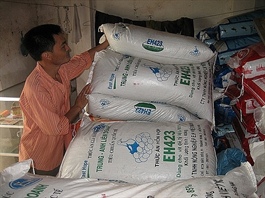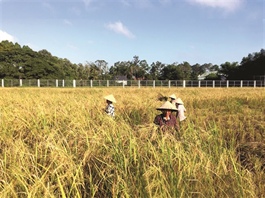MARD asks to halt fertiliser exports
MARD asks to halt fertiliser exports
Due to the sharp increase in fertiliser prices in the past three months, the Plant Protection Department under the Ministry of Agriculture and Rural Development has proposed stopping fertiliser exports.

The proposal aims to ensure domestic supply at the most reasonable price, heard a recent meeting of the Viet Nam Fertiliser Association and leaders of three fertiliser producers in Ha Noi.
Along with maximising capacity and stopping exports, businesses need to provide transparent information about the production situation and selling price so authorities have a basis to prevent speculation and hoarding to push up the selling price, said Hoang Trung, director of Plant Protection Department.
The department and the Ministry of Agriculture and Rural Development will assign units to work with localities to inspect and examine to detect speculation, storage and fake fertiliser.
Regarding the increasing price of diammonium phosphate (DAP) fertiliser, production enterprises explained that the price increase was due to the rising price of DAP globally.
China is increasing the cultivation of maize and soybeans to serve the needs of raw materials for animal feed after the African swine fever virus, leading to a sharp growth in the demand for fertiliser.
In addition, the most unusual changes in raw material prices for DAP fertiliser production in the world are sulfur (S) and ammonia (NH3), affecting the cost of fertiliser products.
Firms have suffered rapid price rises and raw material scarcity, with some uneven to buy sulfur, said Vu Van Bang, general director of DAP Vinachem (DAP Dinh Vu) said.
The price of sulfur to the DAP production plants has doubled from November last year to February this year. It increased from US$95 per tonne to $208 per tonne.
The price of ammonia jumped 31.4 per cent, equivalent to an increase of $102 per tonne.



























